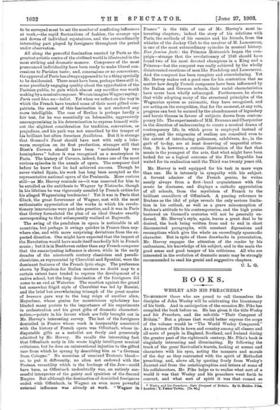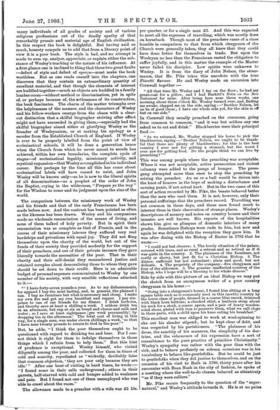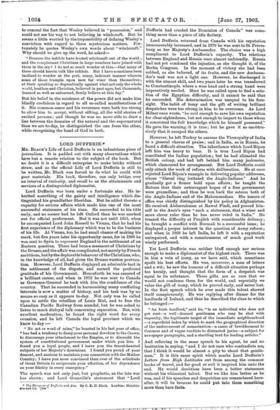BOOKS.
WESLEY AND HIS PREACHERS.*
TO-MORROW those who are proud to call themselves the disciples of John Wesley will be celebrating the bicentenary of his birth. And in anticipation of the occasion Mr. Pike has compiled the book before us. He has given it the title Wesley and his Preachers, and the sub-title " Their Conquest of Britain." But a phrase that would better express the scope of the volume would be " The World Wesley Conquered." As a picture of life in town and country among all classes and all sorts of people in England, Scotland, and Ireland during the greater part of the eighteenth, century, Mr. Pike's book is singularly interesting and illuminating. By following the track of the great Revivalist's travels, looking at scenes and characters with his eyes, noting the manners and morals of the day as they contrasted with the spirit of Methodist preaching, and, above all, by quoting freely from Wesley's Journal and from the autobiographies and letters of some of his collaborators, Mr. Pike helps us to realise what sort of a world it was that Wesley and his preachers went forth to convert, and what sort of spirit it was that roused so • Wesley and his Preachers: their Conqued of Britain. By G. Holden Pike, London: T. Fisher Unwin. Pa. 6d.]
many individuals of all grades of society and of various religious professions out of the deadly apathy of that remarkably prosaic and material age of English civilisation. In this respect the book is delightful. But having said so much, honesty compels us to add that from a literary point of view it is a poor book. The style is bad, and no attempt is made to sum up, analyse, appreciate, or explain either the sub- stance of Wesley's teaching or the nature of his influence. At
a first glance one is inclined to thing that these two great faults —defect of style and defect of aperfu—must make the book worthless. But as one reads oneself into the chapters, one discovers that they contain an extraordinary quantity of
excellent material, and that though the elements of interest are huddled together—much as objects are huddled in a family lumber-room—without method or discrimination, yet in spite of, or perhaps because of, the artlessness of its construction, the book fascinates. The charm of the matter triumphs over the helplessness of the manner, and the characters of Wesley and his fellow-workers emerge from the chaos with a clear- cut distinction that a skilful biographer striving after effect might not have succeeded in giving them,—especially had the skilful biographer aimed either at glorifying Wesley as the founder of Wesleyanism, or at making his apology as a seceder from the Established Church of England. If Wesley is ever to be properly labelled from the point of view of ecclesiastical schools, it will be done a generation hence when the Church from which he never meant to secede has achieved, within her own boundaries, the complete cycle of stages—of ecclesiastical legality, missionary activity, and mystical expansion—that Wesley accomplished in his individual career. But perhaps by the time all this has come about ecclesiastical labels will have ceased to exist, and John Wesley will be known only—as he is now to the liberal spirits of all denominations—as a prophet of the order of John the Baptist, crying in the wilderness, " Prepare ye the way " for the Wisdom to come and its judgment upon the sins of the world.
The comparison between the missionary work of Wesley and his friends and that of the early Franciscans has been made before now. And the contrast has been pointed as often as the likeness has been drawn. Wesley and his companions made no wholesale renunciation of the means of living, and none of them talked of holy poverty. But in spirit their renunciation was as complete as that of Francis, and in the course of their missionary labours they suffered very real hardships and privations with equal joy. They did not fling themselves upon the charity of the world, but out of the funds of their society they provided modestly for the support of their preachers, and out of their private incomes they gave liberally towards the necessities of the poor. That in their charity and their self-denial they remembered justice and retained scruples about demoralising those to whom they gave should be set down to their credit. Here is an admirable budget of personal expenses communicated to Wesley by one member of his society, with very sensible reflections attached to it :— "4 I have forty-seven pounds a year. As to my disbursements, for apparel I buy the most lasting, and, in general, the plainest I can. I buy no furniture but what is necessary and cheap. I make my own fire and get my own breakfast and supper. I pay six- pence to one of our friends for my dinner. I drink herb-tea, and thereby save at least a shilling a week. I seldom drink tea in an afternoon, but sup at six on bread and cheese and milk and water ; so I save at least eightpence [per week presumably] by dropping tea in the afternoon.' The total cost of living in this way, for a single man, was under eleven shillings a week, so that I have near twenty pounds to return to God in the poor.'" But, he adds, " I think the poor themselves ought to be questioned with regard to drinking tea and beer. For I can- not think it right for them to indulge themselves in those things which I refrain from to help them." But this hint of prudence is exceptional. Wesley himself, who visited diligently among the poor, and collected for them in times of cold and scarcity, repudiated as "wickedly, devilishly false that common objection, ' they are poor only because they are idle.'" After one bout of visiting in hard times, he wrote :— " I found some in their cells underground ; others in their garrets, half-starved with cold and hunger added to weakness and pain. But I found not one of them unemployed who was able to crawl about the room."
The allowance made to a preacher with a wife was £5 per quarter, or for a single man £3. And this was expected to meet all the expenses of travelling, which was mostly done on horseback. Though most of the preachers came of a class humble in comparison to that from which clergymen of the
Church were generally taken, they all knew that they could have done better for themselves in trade. But upon the
Wesleyan no less than the Franciscan rested the obligation to suffer joyfully, and in this matter the example of the Master never failed his disciples. Low spirits were unknown to
Wesley. It is from the diary of John Nelson, the stone- mason, that Mr. Pike takes this anecdote with the true Fioretti flavour. He and Wesley made an excursion into Cornwall together :- " All that time Mr. Wesley and I lay on the floor ; he had my great-coat for a pillow, and I had Burkitt's Notes on the New Testament for mine. After being here near three weeks, one morning about three o'clock Mr. Wesley turned over, and, finding
me awake, clapped me on the side, saying Brother Nelson, let us be of good cheer; I have one whole side yet, for the skin is off but on one side."
In Cornwall they usually preached on the commons, going from common to common, "and it was but seldom any one asked us to eat and drink." Blackberries were their principal food :-
"As we returned, Mr. Wesley stopped his horse to pick the blackberries, saying Brother Nelson, we ought to be thank- ful that there are plenty of blackberries ; for this is the best country I ever saw for getting a stomach, but the worst I ever saw for getting food. Do the people think we can live by preaching ? "
This was among people where the preaching was acceptable. Where it was not acceptable, active persecution and violent calumny were added to the pangs of hunger. The press- gang attempted more than once to stop the preaching by seizing the preacher. An ox or a bull would be driven into the knot of hearers in the hope of making a disturbance and causing panic, if not actual hurt. But in the two cases of this sort of action recorded by Mr. Pike, the beasts behaved better than the men who used them. It is not, however, only their personal sufferings that the preachers record. Travelling was not common in those days, and these men found much to interest them in their observation of strange places. Wesley's descriptions of scenery and notes on country houses and their inmates are well known. His reports of the hospitalities shown him give us glimpses of domestic interiors of many
grades. Sometimes Bishops were rude to him, but now and again he was delighted with the reception they gave him. It was after dining with the Bishop of Exeter in 1782 that he
wrote :-
" I could not but observe: 1. The lovely situation of the palace, covered with trees, and as rural a retreat and as retired as if it was quite in the country. 2. The plainness of the furniture, not costly or showy, but just fit for a Christian Bishop. 3. The dinner, sufficient but not redundant ; plain and good, but not delicate. 4. The propriety of the company—five clergymen and four of the aldermen. 5. The genuine unaffected courtesy of the Bishop, who I hope will be a blessing to his whole diocese."
Side by side with this picture of an ideal Bishop we may put the sketch from an anonymous writer of a poor country clergyman in his home :—
" Going into a clergyman's house, I found him sitting at a long square table such as is commonly used in this (north) country by the lower class of people, dressed in a coarse blue smock, trimmed with black horn buttons; a checked shirt, a leathern strap about his neck for a stock, a coarse apron, and a pair of heavy wooden- soled shoes, plated with iron to preserve them, what we call clogs in these parts, with a child upon his knee eating his breakfast."
This excellent man was obliged to work at wool-spinning to eke out his slender stipend ; but he kept clear of debt, and was respected by his parishioners. " The plainness of his dress, the sanctity of his manners, the simplicity of his doc- trine, and the vehemence of his expression have a sort of resemblance to the pure practice of primitive Christianity." Wesley's sympathy was rather with the poor than with the
rich, and to behave profanely on solemn occasions was in his vocabulary to behave like gentlefolks. But he could be just to gentlefolks when they did justice to themselves, and on the occasion of his visit to Bath in 1789, thirty years after his encounter with Beau Nash in the city of fashion, he spoke of a meeting where the well-to-do classes behaved as attentively "as if they were colliers."
Mr. Pike recurs frequently to the question of the " super- natural," and Wesley's attitude towards it. He is at no pains to conceal the fact that Wesley believed in "possession," and could not see his way to not believing in witchcraft. But he seems a little worried by the impossibility of defining Wesley's conviction with regard to these mysterious matters. For- tunately he quotes Wesley's own words about "witchcraft." Why-should we give up the word, he asked— "Because the infidels have hooted witchcraft ont of the world ; and the complaisant Christians in large numbers have joined with them in the cry P I do not so much wonder at this,—that many of these should herein talk like infidels. But I have sometimes been inclined to wonder at the pert, saucy, indecent manner wherein some of these_ trample upon men far' wiser than themselves ; at their speaking so dogmatically against what not only the whole world, heathen and Christian, believed in past ages, but thousands, learned as well as unlearned, firmly believe at this day."
But his belief in the existence of the power did not make him blindly credulous in regard to all so-called manifestations of it. His common-sense and his reverence were both too strong to allow him to accept, without sifting, all the wild stories of excited persons ; and though he was no more able to draw a line between the domains of the natural and the supernatural than we are to-day, he distinguished the one from the other, while recognising the hand of God in both.
























































 Previous page
Previous page